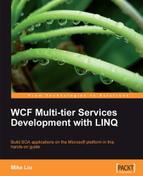The first new feature that is very important for LINQ is the new data type, var. This is a new keyword that can be used to declare a variable, and this variable can be initialized to any valid C# data.
In the C# 3.0 specification, such variables are called implicitly-typed local variables.
A var variable must be initialized when it is declared. The compile-time type of the initializer expression must not be of null type, but the real time expression can be null. Once it is initialized, its data type is fixed to the type of the initial data.
The following statements are valid uses of the var keyword:
// valid var statements var x = "1"; var n = 0; string s = "string"; var s2 = s; s2 = null; string s3 = null; var s4 = s3;
At compile time, the above var statements are compiled to IL like this:
string x = "1"; int n = 0; string s2 = s;
The var keyword is only meaningful to the Visual Studio 2008 compiler. The compiled assembly is actually a valid .NET 2.0 assembly. It doesn't need any special instructions or libraries to support this feature.
The following statements are invalid usages of the var keyword:
// invalid var statements var v; var nu = null; var v2 = "12"; v2 = 3;
The first one is illegal because it doesn't have an initializer.
The second one initializes variable nu to null which is not allowed, although once defined, a var type variable can be assigned null. If you think that at compile time, the compiler needs to create a variable using this type of initializer, then you understand why the initializer can't be null at compile time.
The third one is illegal because once defined, an integer can't be converted to a string implicitly (v2 is a type of string).
